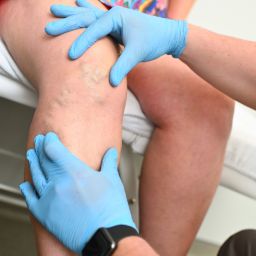
Maintaining optimal arterial health is crucial for overall well-being, as arteries play a vital role in delivering oxygen-rich blood throughout the body. At Sonoran Vein & Endovascular, we emphasize the importance of proactive lifestyle modifications to support vascular health and prevent arterial diseases. This article explores effective strategies to enhance arterial function and reduce the risk of conditions such as peripheral artery disease (PAD) and atherosclerosis.
Embrace a Heart-Healthy Diet
A balanced diet rich in nutrients is fundamental to arterial health. Incorporating foods that promote vascular function can significantly reduce the risk of arterial blockages.
Fruits and Vegetables: These are high in antioxidants and fiber, which help combat oxidative stress and lower cholesterol levels.
Whole Grains: Brown rice, oats, and whole wheat bread provide essential nutrients and aid in maintaining healthy blood pressure.
Lean Proteins: Sources like fish, poultry, and legumes support muscle health without contributing to arterial plaque buildup.
Healthy Fats: Unsaturated fats found in nuts, seeds, and olive oil can improve cholesterol profiles and reduce inflammation.
Conversely, it’s advisable to limit intake of saturated fats, trans fats, and sodium, as these can contribute to arterial stiffness and hypertension.
Engage in Regular Physical Activity
Physical activity is a cornerstone of arterial health. Regular exercise enhances blood circulation, strengthens the heart muscle, and helps maintain a healthy weight.
Aerobic Exercises: Activities such as walking, cycling, and swimming improve cardiovascular endurance and arterial flexibility.
Strength Training: Incorporating resistance exercises twice a week can aid in weight management and glucose metabolism.
Flexibility and Balance: Practices like yoga and tai chi promote vascular health by reducing stress and improving circulation.
Aim for at least 150 minutes of moderate-intensity aerobic activity per week, complemented by muscle-strengthening activities on two or more days.
Maintain a Healthy Weight
Excess body weight, particularly around the abdomen, increases the risk of arterial diseases. Obesity is associated with higher levels of LDL cholesterol and triglycerides, which can lead to plaque formation in the arteries.
Achieving and maintaining a healthy weight through diet and exercise reduces the strain on the heart and arteries, lowering the risk of hypertension and type 2 diabetes.
Quit Smoking
Smoking is a significant risk factor for arterial disease. The chemicals in tobacco damage the endothelium, the inner lining of the arteries, leading to inflammation and narrowing of the vessels.
Quitting smoking has immediate and long-term benefits for arterial health, including improved circulation and reduced risk of heart attack and stroke.
Manage Stress Effectively
Chronic stress contributes to arterial damage by increasing blood pressure and promoting inflammation. Implementing stress-reduction techniques can have a positive impact on vascular health.
Mindfulness and Meditation: These practices help lower stress hormones and improve heart rate variability.
Regular Physical Activity: Exercise is a natural stress reliever that also benefits arterial health.
Adequate Sleep: Ensuring 7-9 hours of quality sleep per night supports overall cardiovascular function.
Monitor and Control Blood Pressure and Cholesterol
High blood pressure and elevated cholesterol levels are primary contributors to arterial disease. Regular monitoring and management through lifestyle changes and, if necessary, medication, are essential.
Blood Pressure: Aim for a reading below 120/80 mm Hg.
Cholesterol: Maintain LDL (“bad”) cholesterol levels below 100 mg/dL and HDL (“good”) cholesterol above 60 mg/dL.
Regular check-ups with healthcare providers can help track these metrics and adjust treatment plans accordingly.
Limit Alcohol Consumption
Excessive alcohol intake can raise blood pressure and contribute to weight gain, both of which negatively impact arterial health. If you choose to drink, do so in moderation — up to one drink per day for women and two for men.
Stay Hydrated
Adequate hydration supports overall circulatory health by maintaining blood volume and viscosity. Aim to drink at least eight 8-ounce glasses of water daily, more if you are active or live in a hot climate.
Regular Health Screenings
Early detection of arterial issues can prevent progression to more severe conditions. Regular screenings for blood pressure, cholesterol, and glucose levels are vital. Additionally, non-invasive tests like ankle-brachial index (ABI) can assess peripheral artery disease risk.
At Sonoran Vein & Endovascular, we offer comprehensive vascular evaluations to identify and address arterial concerns promptly.
Take the First Step Towards Better Arterial Health
Improving arterial health is a multifaceted approach that involves dietary changes, physical activity, weight management, and regular medical check-ups. By adopting these lifestyle modifications, you can significantly reduce the risk of arterial diseases and enhance your overall quality of life.
Sonoran Vein & Endovascular is dedicated to supporting you on this journey. Our team of experts provides personalized care and advanced treatments to help you achieve optimal vascular health.
Contact us today to schedule a consultation and take proactive steps towards a healthier future.
















